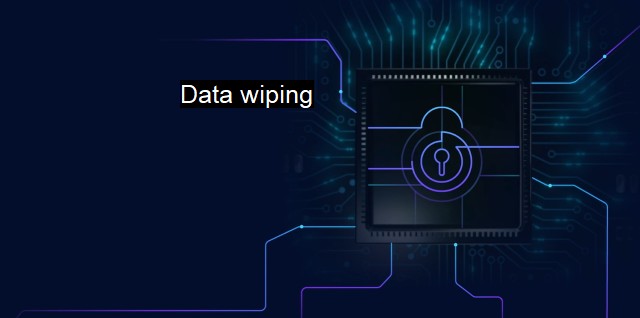What is Data wiping?
The Importance of Data Wiping in Today's Digital Age: Safeguarding Confidential Information from Cyber Threats
Data wiping is an operational activity intended to protect critical information from unauthorized access. This process involves the complete and irreversible removal of data stored on different types of digital media devices. It is widely used in the cybersecurity and antivirus world to eliminate potential vulnerabilities, address attacks that have occurred, and provide a secure environment for individuals, businesses, or government entities.When a file is wrongly assumed to be deleted, the physical imprint left on the device is the piece of data that continues to linger even after the deletion is complete. This aspect is among the primary reasons data wiping is essential in cybersecurity. Data wiping goes beyond deletion; it overwrites each sector where the data previously resided, essentially eradicating traces of the files' existence.
Three main methods are currently used for the data-wiping process, namely, cryptographic erasure, physical destruction, and overwriting.
Cryptographic erasure method employs an encryption key to encrypt data. This encryption key is subsequently eliminated, rendering the data inaccessible and virtually deleted as retrieval would require massive computational resources that exceed any logical measures. Cryptographic erasure is more suitable for modern storage devices that work exceptionally well with this method due to faster processing times.
The physical destruction method is arguably the most straightforward to comprehend but carries risks to the environment and people due to potential harmful substances released during the destruction process. It typically involves incinerating, pulverizing, disintegrating, or even shredding storage devices - a thoroughly effective method to obliterate any sensitive content stored in them. Such a method is typically used on end-of-life hardware that is obsolete or outmoded.
Overwriting involves writing over each bit of information in memory storage several times. It is the most common and reliable method for average users due to its convenience. Software tools used for overwriting can thoroughly wipe data, making them irretrievable even by forensic tools. It is competent to delete individual files, whole drives, or even entire storage systems.
Understanding the importance of data wiping in antivirus software is also crucial. Today's antivirus solutions evolve from merely detecting and removing viruses to performing data wipes and offering holistic, end-to-end security solutions. Antivirus software often includes data wiping features to mitigate the risk of backdoor intrusions or data leaks. It is especially helpful before reselling or disposing of a device, to prevent sensitive information from falling into the wrong hands.
Nonetheless, while antivirus software data wiping is highly capable, it still has its limitations. Most antivirus solutions do not overwrite data but rather focus more on deletion. It primarily depends on users to know their settings well to get these tools' most optimal benefits mentioned. Organizations and individuals are strongly advocated to augment their devices with the full-featured, standalone data wiping tools for added security.
Data wiping is a cybersecurity measure employed to ensure data protection. Its strength lies in eliminating data thoroughly and permanently that can not be recovered, decreasing any risk of data leakage, data breaches, or unauthorized access profoundly. To maximize cybersecurity, a combination of an excellent antivirus with robust data-wiping features and standalone data wiping tools can significantly enhance a device’s security level. Today, data wiping is more than just an additional feature. It shapes the new standard of cybersecurity measures in protecting the digital universe - an essential task in ensuring unyieldered privacy in an alarmingly non-private world.

Data wiping FAQs
What is data wiping in the context of cybersecurity and antivirus?
Data wiping is a process of permanently erasing all data from a storage device, rendering it unrecoverable. This process is used as a security measure to protect sensitive or confidential information from falling into the wrong hands.Why is data wiping important in the context of cybersecurity and antivirus?
Data wiping is important in the context of cybersecurity and antivirus because it helps to prevent data breaches and data theft. By wiping the data from a storage device, organizations can ensure that sensitive information does not fall into the hands of cybercriminals, hackers, or other malicious actors.What are the different methods for data wiping?
There are several methods for data wiping, including overwriting, degaussing, and physical destruction. Overwriting involves writing new data over the old data, making it impossible to recover the original data. Degaussing involves using a magnetic field to erase data from a storage device. Physical destruction involves physically destroying the storage device, rendering it unusable.Can data wiping be done on mobile devices and computers?
Yes, data wiping can be done on mobile devices and computers. There are software programs and tools available that can wipe data from these devices securely. However, it is important to ensure that all data is backed up before wiping it, as the process is irreversible.| | A | | | B | | | C | | | D | | | E | | | F | | | G | | | H | | | I | | | J | | | K | | | L | | | M | |
| | N | | | O | | | P | | | Q | | | R | | | S | | | T | | | U | | | V | | | W | | | X | | | Y | | | Z | |
| | 1 | | | 2 | | | 3 | | | 4 | | | 7 | | | 8 | | |||||||